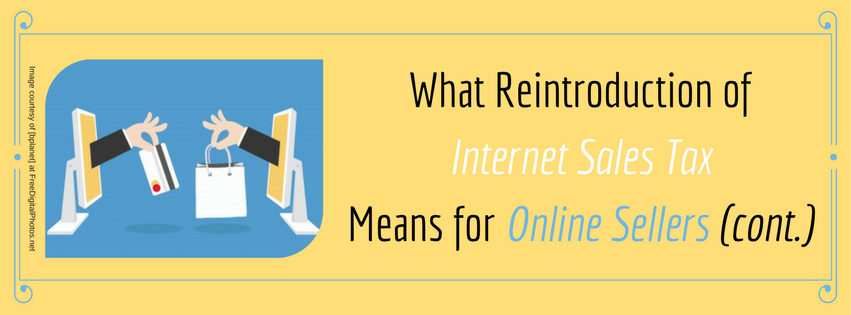In our last blog post, we featured an article discussing the Marketplace Fairness Act (MFA) and how it negatively affects small business owners. You can read that post here: (http://bit.ly/2rI3BFq). This post will focus on the second internet sales tax bill being introduced, the Remote Transaction Parity Act (RTPA) and the unfair burden it will have on online sellers.
Recap of the Remote Transaction Parity Act
Similar to the Marketplace Fairness Act, the Remote Transaction Parity Act would not affect existing nexus, but would require retailers to collect sales tax in remote states, as well as in states where they have nexus.
The RTPA works on a tiered system, with online sellers making $10 million in sales or more subjected to the law in the first year, online sellers making $5 million in sales or more subjected to the law in the second year, and online sellers making more than $1 million in sales subjected to the law in the first year. EXCEPT online sellers who utilize “an electronic marketplace for the purpose of making products or services available for sale to the public.” These sellers – a grandmother who sells on eBay after retirement or a college student dipping her toe in the water to sell on Etsy – would be required to collect sales tax in every state, no matter if they make $10mm in sales in a year or $10,000. Sellers on online marketplaces – which are right now the training ground for online sellers getting their eCommerce start – would be subject to the administrative burden of collecting sales tax from buyers in every state where they make a sale.
Summary: More than any other bill, the RTPA demonstrates an ignorance of how the eCommerce economy truly works. Subjecting all online marketplace sellers to the demands of sales tax in all U.S. states will hurt the small business that the bill purports to help. Not all small mom & pop businesses are on Main St. anymore – a lot of them are now in mom & pop’s garage using their Amazon account.
Summary
TaxJar is a sales tax software, and we would most likely benefit from the increased complexity online sellers would face due to the passage of the Marketplace Fairness Act or the Remote Transaction Parity Act. But, here at TaxJar, we strongly oppose both bills. They would be detrimental to the online sellers that we serve. In the long term, nobody benefits when the small business owners who drive this economy are buried under mountains of sales tax law.
As I’ve said ad nauseam in the past, these two bills betray a basic lack of understanding of how eCommerce today works. Congress thinks these bills are striking at behemoths like Amazon, when they are really striking at small one or two person businesses. Clauses like the $1 million cap in the Marketplace Fairness Act may seem to an out-of-touch Congress like safeguards, but as any online sellers knows, this business has slim margins and a business with $1 million dollars in sales can be barely profitable.
The fact that Congress thinks that some hazy notion of “software” will fix this problem for online sellers betrays another basic misunderstanding when it comes to how our state sales tax systems works. There is no magic button you can push to make sales tax compliance easy. Believe me.
Unfortunately, the one bill that was somewhat fair to all retailers as well as states who want to make sure they collect their share of sales tax – the Sales Tax Simplification Act of 2016 – is nowhere to be found in the 115th Congress.
We urge you to ask your representatives to vote against both of these bills. In the meantime, we’ll keep updating the blog with new info as the battle against unfair online sales tax continues.
This article was written by TaxJar’s Founder, Mark Faggiano. His current mission is to make sales tax simple for online sellers and has written several articles on the subject.
Image courtesy of [bplanet] at FreeDigitalPhotos.net
